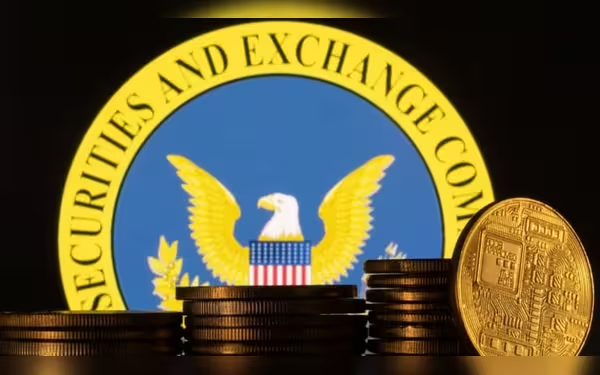Sunday, November 17, 2024 01:38 AM
US SEC Charges Cumberland DRW for Unregistered Crypto Trading
- Cumberland DRW charged for unregistered crypto transactions.
- SEC emphasizes registration for all crypto dealers.
- Ongoing tension between crypto firms and regulators.
 Image Credits: channelnewsasia
Image Credits: channelnewsasiaThe US SEC has charged Cumberland DRW for operating as an unregistered dealer in the crypto market, highlighting regulatory compliance issues.
In a significant development in the world of cryptocurrency regulation, the U.S. Securities and Exchange Commission (SEC) has charged Cumberland DRW, a prominent crypto market maker, for operating as an unregistered dealer. This action comes after the SEC identified that Cumberland had engaged in transactions involving over $2 billion in crypto assets without the necessary registration since March 2018.
The SEC's statement highlights that Cumberland was involved in buying and selling crypto assets that the agency classified as securities. These transactions were conducted on third-party crypto exchanges, which raises questions about compliance with federal securities laws. Jorge G. Tenreiro, the acting chief of the SEC's crypto assets and cyber unit, emphasized the importance of registration, stating, "The federal securities laws require all dealers in all securities to register with the Commission, and those who operate in the crypto asset markets are no exception." This statement underscores the SEC's firm stance on regulating the rapidly evolving crypto market.
In response to the charges, a spokeswoman for Cumberland expressed frustration, calling the situation "incredibly frustrating and disappointing." She pointed out that despite SEC Chairman Gary Gensler's encouragement for companies to "come in and register," Cumberland has faced restrictions that have prevented it from using its now-dormant registered broker-dealer for crypto activities. The spokeswoman argued, "We cannot comply with rules that do not exist or a framework that regulators are interpreting to prohibit trading in natively issued crypto assets." This highlights the ongoing tension between crypto firms and regulatory bodies.
The SEC's position is that most cryptocurrency tokens should be classified as securities, thus subjecting them to registration requirements. However, many in the crypto industry dispute this classification, arguing that cryptocurrencies differ fundamentally from traditional securities like stocks and bonds. This disagreement has led to legal battles between the SEC and several major crypto platforms, including Coinbase, Binance, and Kraken, all of which contend that their assets do not fit the definition of securities.
As the regulatory landscape for cryptocurrencies continues to evolve, the outcome of these legal disputes will likely have far-reaching implications for the industry. The SEC's actions against Cumberland DRW serve as a reminder of the importance of compliance in a market that is still finding its footing. For investors and companies involved in cryptocurrency, staying informed about regulatory changes and understanding the legal framework is crucial. The ongoing dialogue between regulators and the crypto community will shape the future of digital assets, making it essential for all stakeholders to engage in this conversation.













